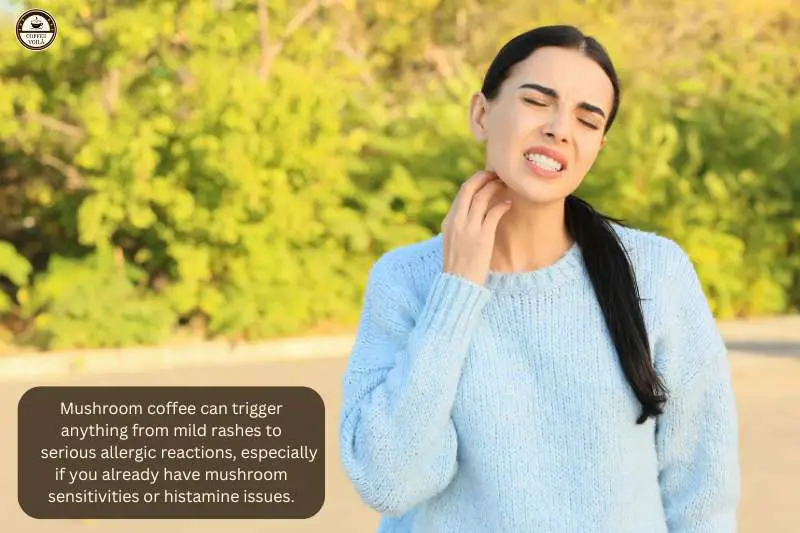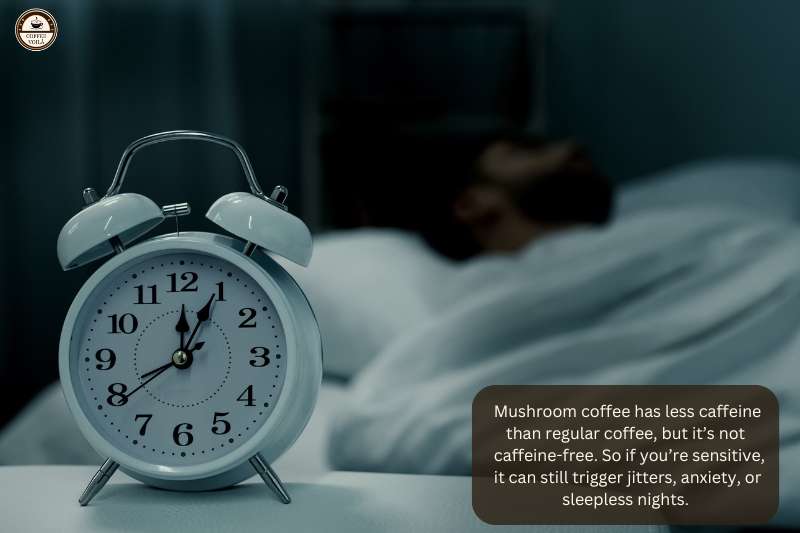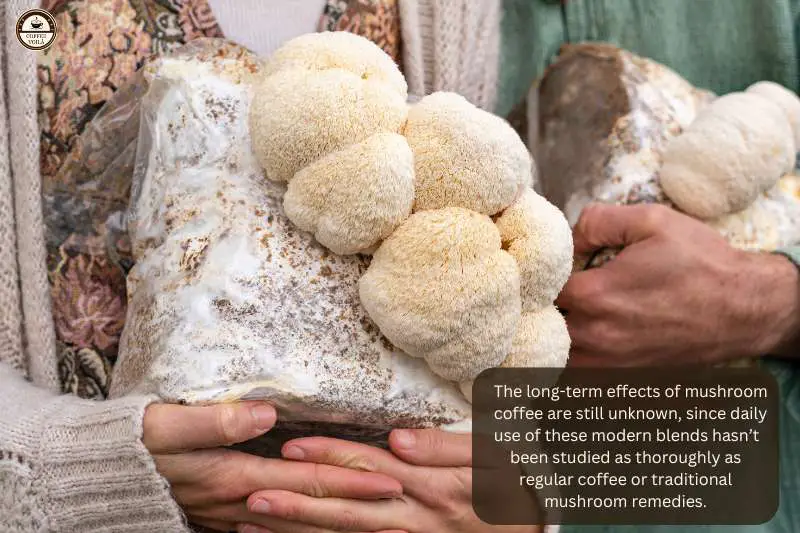5 Mushroom Coffee Side Effects (What Can You Expect?)
Last updated on September 9th, 2025 at 10:23 am
Ever wondered if that trendy cup of mushroom coffee could do you more harm than good?
A few months ago, I shared my experience with mushroom coffee, how it gave me smoother energy without the usual crash. But here’s the thing: while I didn’t run into problems, not everyone has the same story.
Some people report bloating, jitters, or even medication interactions, which means the health perks come with fine print.
That’s where this guide comes in.
We’re going to break down the most common mushroom coffee side effects, why they happen, and what you can do to minimize them. By the end, you’ll know exactly what to watch for, and whether you should drink it or not.
5 Mushroom Coffee Side Effects
If you’re the type who likes to skim, here’s a quick table that breaks down the five most common side effects. For the full story, including tips and details, keep reading below.
| Side Effect | What It Means | Why It Happens |
|---|---|---|
| 1 – Digestive discomfort | Bloating, gas, or diarrhea | Mushrooms are high in fiber and prebiotics, which can upset digestion, especially if you’re new to them |
| 2 – Allergic reactions | Rash, itching, swelling, or breathing issues | Functional mushrooms (like reishi or lion’s mane) can still trigger allergies in sensitive people |
| 3 – Medication interactions | Drugs may become less effective or too strong | Mushrooms can interfere with blood thinners, blood pressure meds, diabetes drugs, and immunosuppressants |
| 4 – Caffeine-related effects | Jitters, anxiety, rapid heartbeat, or insomnia | Mushroom coffee has less caffeine than regular coffee, but it’s not caffeine-free |
| 5 – Uncertain long-term effects | Unknown risks from daily use | Research is limited on concentrated mushroom + coffee blends, and quality varies by brand |
1 – Digestive Discomfort (Bloating or Upset Stomach)
Usually, mushroom coffee digestive issues are about dose and timing. The fact is functional mushrooms (reishi, lion’s mane, cordyceps) are rich in beta-glucans, polysaccharides, and prebiotic fibers that can feed your gut bacteria.
That’s great long-term for microbiome balance. But on day one, it can feel like bloating, or even mild diarrhea.
My first go was a full scoop on an empty stomach (not a good idea!). Those fibers, combined with coffee acids (chlorogenic acids), hit fast, and the stomach upset felt like a mini-storm.

I learned to change one variable at a time:
Smaller serving, with food, and not stacking other gut-stimulating stuff (like magnesium citrate or MCT) in the same cup. Much calmer.
Different brands
Another thing people miss: blends aren’t standardized. One “teaspoon” from Brand A can pack more fruiting-body powder than Brand B.
If your cup suddenly feels harsher, it’s not in your head; concentration swings matter. Also, brewing style affects tolerance.
Brewing matters
A smoother traditionally brewed coffee base tends to sit better for me than ultra-concentrated espresso shots, which can be rough when your gut’s already learning new prebiotics.
Watch patterns
If bloating happens within 30–60 minutes, try moving your cup to mid-morning after breakfast. If it shows up hours later, it might be fermentation from the added fibers; spacing your intake or lowering the dose helps.
And don’t stack multiple adaptogens on day one. Instead, give your gut a clean A/B test so you know what’s doing what.
Tip: Start with ¼–½ serving mixed into food (oatmeal or a protein smoothie), sip slowly, and wait 48–72 hours before increasing. This lets your microbiome adapt and reduces bloating, gas, and stomach upset.
2 – Allergic Reactions or Sensitivities
If you’ve got a mushroom allergy or sensitivity, mushroom coffee is not your friend. Even though brands market reishi, lion’s mane, or cordyceps as “functional mushrooms,” your immune system doesn’t care.
These fungi contain unique compounds, such as polysaccharides, sterols, cordycepin, and erinacines. For sensitive people, those can trigger the same response you’d get from eating shiitake or button mushrooms.
Also, reactions range from mild to scary. Some people experience itchy skin or a rash. Meanwhile, others suffer from digestive upset, including bloating, nausea, or diarrhea.

In rare but serious cases, mushroom coffee could set off swelling, hives, or breathing difficulties. A
And because mushroom powders aren’t standardized. One cup might feel fine, and the next could have a higher dose of those compounds that push your body over the edge.
Interestingly, the 2024 research on mushroom coffee flagged allergies as one of the top contraindications. This alongside conditions like hypertension and histamine intolerance.
That makes sense, since certain mushroom bioactives can act as histamine triggers. That’s bad news if you already struggle with food sensitivities or intolerance.
Basically, what’s meant to help your body could accidentally send your immune system into overdrive.
Tip: If you’ve ever reacted to mushrooms, even a “mild” reaction, skip mushroom coffee altogether. It’s not worth gambling with your immune system.
Instead, stick to regular coffee or try caffeine-free alternatives like chicory or dandelion root coffee if you still want that earthy flavor without the allergy risk.
3 – Medication Interactions
It’s easy to assume that because it’s “just coffee with mushrooms,” there aren’t any risks. But functional mushrooms like reishi, cordyceps, and lion’s mane contain bioactive compounds.
For instance, polysaccharides, sterols, and even naturally occurring substances like lovastatin and ergosterol (the 2024 study found them in brewed mushroom coffee).

Anyway, these can interact with prescription meds in ways that aren’t always obvious.
- Blood thinners (e.g., warfarin): Some mushrooms, particularly reishi, have anticoagulant properties. Now, combine that with blood thinners, and you may end up with an increased risk of bleeding or bruising.
- Blood pressure drugs: Reishi has been linked to lowering blood pressure. On its own, that might sound like a perk. However, if you’re already on hypertension medication, mushroom coffee can push things too low. This may cause dizziness or lightheadedness.
- Diabetes medication: Mushrooms may influence blood sugar regulation. If you pair them with diabetes drugs, you could face episodes of hypoglycemia that are hard to predict.
- Immunosuppressants: Mushrooms like cordyceps stimulate immune function. If you’re taking medication designed to suppress your immune system, that benefit flips into a drawback. Plus, the mushrooms may counteract the drug’s effectiveness.
The frustrating part is that these interactions don’t always appear immediately. You might feel fine for weeks, then notice side effects creeping in.
Tip: If you take daily medication, always check with your doctor before trying mushroom coffee. A quick conversation can save you trouble later. As they say, “better safe than sorry.”
4 – Caffeine-Related Side Effects
One of the biggest reasons people switch to mushroom coffee is the promise of less caffeine. And that’s true; it commonly has about half the caffeine of a regular cup, depending on the brand and the amount of mushroom powder they blend in.
However, it’s not caffeine-free. If you’re someone who struggles with jitters, insomnia, anxiety, or heart palpitations, mushroom coffee can still stir up those same problems. In fact, the study (already mentioned) on mushroom coffee showed something interesting:

Adding mushrooms like Cordyceps militaris and Hericium erinaceus did reduce caffeine content compared to plain brewed coffee.
A traditional brew clocked in around 5.6 mg of caffeine per 200 mL, while mushroom blends dropped that number. That’s definitely a softer kick. However, it’s still enough to cause side effects if you’re caffeine-sensitive.
Another fact is that mushroom coffee doesn’t only deliver caffeine. It also brings in extra bioactive compounds like lovastatin (from lion’s mane) and ergosterol (from cordyceps).
Your body is juggling more than simply the caffeine hit. This can make reactions harder to predict. Some people find the mix smoother, while others feel the side effects more strongly than expected.
The tough part is that caffeine sensitivity is personal. For some, one cup in the morning feels amazing; for others, even a small dose leaves them wired at midnight.
Tip: If you know caffeine messes with your sleep or nerves, drink mushroom coffee earlier in the day and limit it to one cup. Or better yet, try mushroom-only blends (no coffee at all) from brands like Four Sigmatic or Ryze. You’ll still get the adaptogens and antioxidants without the caffeine crash.
5 – Uncertain Long-Term Effects
Here’s the thing: it’s still pretty new as a daily wellness drink. Sure, people have been drinking coffee for centuries, and medicinal mushrooms have a long history in traditional medicine.
But blending the two in concentrated powders and drinking them every morning? That’s a modern experiment, and the long-term effects aren’t fully understood yet.
The research mentioned comparing coffee with Cordyceps militaris and Hericium erinaceus fruiting bodies did show some exciting benefits.

For example, brewed coffee with cordyceps had higher levels of minerals like magnesium, potassium, and calcium.
Plus unique bioactive compounds including lovastatin (linked to cholesterol control) and ergosterol (a precursor to vitamin D2). At the same time, the study also found that adding mushrooms reduced typical coffee compounds such as caffeine and chlorogenic acids.
In other words, mushroom coffee isn’t just coffee; rather, it’s a different beverage chemically. That shift could be helpful, but it also means your body is adapting to new compounds every time you sip.
The uncertainty comes from dose and frequency.
Most clinical studies on mushrooms look at supplements in controlled amounts, rather than cups of coffee where concentrations vary wildly between brands.
One scoop of mushroom powder from Brand A isn’t always equal to Brand B. Without standardized testing, it’s tough to say what long-term daily use will do. Especially if you’re drinking multiple cups a day.
So while mushroom coffee seems safe for most healthy adults in moderation, we don’t have decades of data like we do for regular coffee.
Tip: Stick with reputable brands (like Four Sigmatic, Ryze, or MUD/WTR). That test for purity and heavy metals, and limit yourself to one cup a day until more long-term research is available.
How to Reduce the Risk of Side Effects
The good news is, most mushroom coffee side effects can be avoided if you’re mindful about how you drink it. A lot of problems come from diving in too fast, choosing low-quality blends, or doubling up on too many adaptogens at once. So here are some recommendations:
| Step | Why It Matters |
|---|---|
| Start slow: half a serving first, then increase gradually | Mushroom powders aren’t standardized, so one brand’s “scoop” could be stronger than another. In the 2024 study, brewed coffee with Cordyceps militaris had much higher levels of bioactive compounds like ergosterol and 4-feruloylquinic acid compared to instant coffee. Starting small gives your gut and nervous system time to adapt. |
| Read labels carefully (look for organic and tested products) | Poor-quality mushroom powders can be contaminated with heavy metals or fillers. Reputable brands test for purity, ensuring you’re getting fruiting bodies (the good stuff) and not just mycelium on grain. |
| Avoid mixing with multiple other adaptogens at once | Cordyceps, reishi, lion’s mane—all have unique bioactives (cordycepin, lovastatin, erinacines). Stacking them with ashwagandha or ginseng in the same cup can overload your system and make it hard to pinpoint what’s causing side effects. |
| Stay hydrated to ease digestion and caffeine side effects | Mushrooms are rich in polysaccharides, which can ferment in your gut and cause bloating. Drinking extra water also helps balance out caffeine’s diuretic effect, so you’re not left feeling drained. |
| Stop drinking if you notice persistent negative reactions | Whether it’s skin rash, stomach upset, or insomnia, your body is sending a signal. The 2024 study even flagged mushroom coffee as unsuitable for people with allergies or histamine intolerance—so don’t push through discomfort. |
Notes: For a deeper dive into each of these risks and who should steer clear, check out this full guide on who should not drink mushroom coffee.
Last Thoughts
Now I’d love to hear from you. Have you ever experienced side effects from mushroom coffee? Do you think the benefits outweigh the risks, or is it not worth it?
And if you’ve tried different brands, did you notice a difference in how they made you feel? Go below and drop your thoughts in the comments. And with that voilà!







